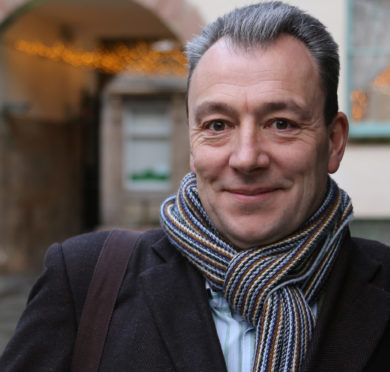
Most of us are yearning to see our friends, family and loved ones in the flesh after an increasingly difficult few months apart.
Glasgow’s Poet Laureate, Jim Carruth, has immortalised these feelings of longing in a new poem about coronavirus, laying bare the emotions felt by those across the city who are separated from their nearest and dearest.
The Long Bench is partly inspired by the parks for which Glasgow is famous, and touches on Carruth’s own feelings of temporary exile from the city where he works for the NHS – the longest period he has been away from Glasgow in 30 years.
Carruth, who has been Poet Laureate for Glasgow since 2014, wrote the poem last month while observing social distancing.
He said: “These past few weeks mark the longest period I’ve been away from Glasgow in 30 years and I was missing the city but also family and friends. For while many of us are communicating digitally over platforms like Zoom, the opportunity to be physically in the company of friends and relations, to just be together, is ruled out.
“The other influence was the fact that Glasgow, the ‘Dear Green Place’, is very much a city of parks. An image came into my head of a bench. Two people could sit at either end, but would that be far enough apart to keep within the social distance?
“Could I use that as an initial image to express that longing to meet up again; wishing for everyone to stay safe while looking forward to that time when it’s over?”
Everyone, he points out, faces different fears and challenges, from bereavement and illness to the pressures confronting key workers and those home-schooling their children.
Yet they also share a longing, “For the lockdown to be ended, so they can spend time with loved ones without those barriers being put in our way”.
The poem has drawn praise from former UK Poet Laureate Carol Ann Duffy, who called it “terrific”, and Scottish musician and author Pat Kane, who described it as “aimed at the heart of now”.
The Poet Laureate for Glasgow is in the gift of the Lord Provost and is managed by charity Glasgow Life. Jim Carruth is the third Poet Laureate for the city following Edwin Morgan and Liz Lochhead.
Glasgow’s Lord Provost Philip Braat said: “The Long Bench is a wonderful poem and an important contribution to the cultural life of the city during this difficult period.
“Jim Carruth’s eloquent lines will find an echo in the hearts of many Glaswegians at a time when everyone in the city is pulling together to keep each other safe by restricting our movements and social contacts.
“Glasgow’s response to the coronavirus crisis has been hugely commendable, but inevitably, people are missing their loved ones and Jim’s poem says so much about our shared feelings. It also strikes a welcome note of hope for the days when we can come together again with our families, friends and neighbours.
“At a time when artistic expression has never mattered more, The Long Bench is a marvellous example of the power of poetry.”
As chair of Glasgow poetry network, “St Mungo’s Mirrorball”, Jim Carruth has observed a flowering of creative activity among his fellow writers since the coronavirus pandemic began.
“There are similarities with the poetry that came out of the last two world wars,” he said. However, he thinks the work likely to emerge from this crisis will differ in focus.
“Much of the poetry that is remembered from the world wars came from the perspective of those participating in the battle zone rather than those left at home. I think it will be much wider this time, taking in much more the viewpoints of those isolating at home as well as those working in hospitals, community settings and so on.
“This is an experience which is shared with every household and that’s a very powerful thing to try and grasp. There are millions of individual stories relating to this crisis, but what’s common to each of us is that this is happening right outside our door. It’s not something that’s happening in some distant place that we’re all just reading about. It’s round the corner, it’s our neighbours, it’s in our own houses.
“It’s a strange time, and a very emotional one. As a poet, especially one working in the NHS, I can’t help but respond to that.”
The Long Bench, by Jim Carruth
For the times ahead
when we will be
as if at either end
of the long bench
where distance kept
is love’s measure
and death dances
the space between
when words alone
are not enough
and queued memories
reach out to touch
let longing be a store
of nut and seed
that grows each day
in strange hibernation
readying for its end –
the sharing of the feast.

Enjoy the convenience of having The Sunday Post delivered as a digital ePaper straight to your smartphone, tablet or computer.
Subscribe for only £5.49 a month and enjoy all the benefits of the printed paper as a digital replica.
Subscribe